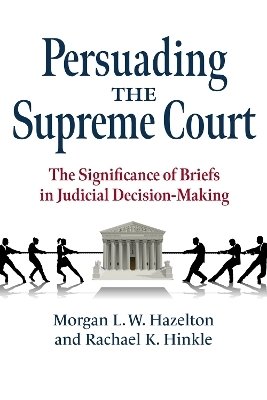
Persuading the Supreme Court
The Significance of Briefs in Judicial Decision-Making
Seiten
2022
University Press of Kansas (Verlag)
978-0-7006-3363-0 (ISBN)
University Press of Kansas (Verlag)
978-0-7006-3363-0 (ISBN)
Drawing on more than 25,000 party and amicus briefs led between 1984 and 2015 and the text of the related court opinions, as well as interviews with former Supreme Court clerks and attorneys, Morgan Hazelton and Rachael Hinkle shed light on one of the more mysterious and consequential features of Supreme Court decision-making.
Each year the public, media, and government wait in anticipation for the Supreme Court to announce major decisions. These opinions have shaped legal policy in areas as important as healthcare, marriage, abortion, and immigration. It is not surprising that parties and outside individuals and interest groups invest an estimated $25 million to $50 million a year to produce roughly one thousand amicus briefs to communicate information to the justices, seeking to impact these rulings. Despite the importance of the Court and the information it receives, many questions remain unanswered regarding the production of such information and its relationship to the Court’s decisions. Persuading the Supreme Court leverages the very written arguments submitted to the Court to shed light on both their construction and impact.Drawing on more than 25,000 party and amicus briefs led between 1984 and 2015 and the text of the related court opinions, as well as interviews with former Supreme Court clerks and attorneys who have prepared and led briefs before the Supreme Court, Morgan Hazelton and Rachael Hinkle have shed light on one of the more mysterious and consequential features of Supreme Court decision-making. Persuading the Supreme Court offers new evidence that the resource advantage enjoyed by some parties likely stems from both the ability of their experienced attorneys to craft excellent briefs and their reputations with the justices. The analyses also reveal that information operates differently in terms of influencing who wins and what policy is announced.
Using those original interviews and quantitative analyses of a rich original dataset of tens of thousands of briefs, with measures built using sophisticated natural language processing tools, Hazelton and Hinkle investigate the factors that influence what information litigants and their attorneys provide to the Supreme Court and what the justices and their clerks do with that information in deciding cases that set legal policy for the entire country.
Each year the public, media, and government wait in anticipation for the Supreme Court to announce major decisions. These opinions have shaped legal policy in areas as important as healthcare, marriage, abortion, and immigration. It is not surprising that parties and outside individuals and interest groups invest an estimated $25 million to $50 million a year to produce roughly one thousand amicus briefs to communicate information to the justices, seeking to impact these rulings. Despite the importance of the Court and the information it receives, many questions remain unanswered regarding the production of such information and its relationship to the Court’s decisions. Persuading the Supreme Court leverages the very written arguments submitted to the Court to shed light on both their construction and impact.Drawing on more than 25,000 party and amicus briefs led between 1984 and 2015 and the text of the related court opinions, as well as interviews with former Supreme Court clerks and attorneys who have prepared and led briefs before the Supreme Court, Morgan Hazelton and Rachael Hinkle have shed light on one of the more mysterious and consequential features of Supreme Court decision-making. Persuading the Supreme Court offers new evidence that the resource advantage enjoyed by some parties likely stems from both the ability of their experienced attorneys to craft excellent briefs and their reputations with the justices. The analyses also reveal that information operates differently in terms of influencing who wins and what policy is announced.
Using those original interviews and quantitative analyses of a rich original dataset of tens of thousands of briefs, with measures built using sophisticated natural language processing tools, Hazelton and Hinkle investigate the factors that influence what information litigants and their attorneys provide to the Supreme Court and what the justices and their clerks do with that information in deciding cases that set legal policy for the entire country.
Morgan L. W. Hazelton is an associate professor of political science and law (by courtesy) at Saint Louis University.Rachael K. Hinkle is an associate professor of political science at the University at Buffalo, SUNY.
List of Figures and Tables
Preface
Acknowledgments
Introduction
1. Briefs and the People Who Produce Them
2. Crafting a Brief
3. Coordinating and Coalescing: Investigating Information Sharing between Briefs
4. The Win/Loss Column: Influencing Case Outcomes
5. Standing Out or Speaking Together: How Individual Briefs Shape Opinion Content
6. Shaping the Law Together: Collectively Influencing Opinion
Content
Conclusion
Appendix A. Interviews
Appendix B. Data Collection, Scope, and Processing
Appendix C. Regression Tables
Notes
Bibliography
Index
| Erscheinungsdatum | 16.09.2022 |
|---|---|
| Verlagsort | Kansas |
| Sprache | englisch |
| Maße | 152 x 228 mm |
| Gewicht | 363 g |
| Themenwelt | Recht / Steuern ► Allgemeines / Lexika |
| Recht / Steuern ► EU / Internationales Recht | |
| Sozialwissenschaften ► Politik / Verwaltung ► Politische Systeme | |
| Sozialwissenschaften ► Politik / Verwaltung ► Staat / Verwaltung | |
| ISBN-10 | 0-7006-3363-4 / 0700633634 |
| ISBN-13 | 978-0-7006-3363-0 / 9780700633630 |
| Zustand | Neuware |
| Haben Sie eine Frage zum Produkt? |
Mehr entdecken
aus dem Bereich
aus dem Bereich
über Alltagsorte des sozialen Zusammenhalts
Buch | Softcover (2024)
transcript (Verlag)
24,00 €


